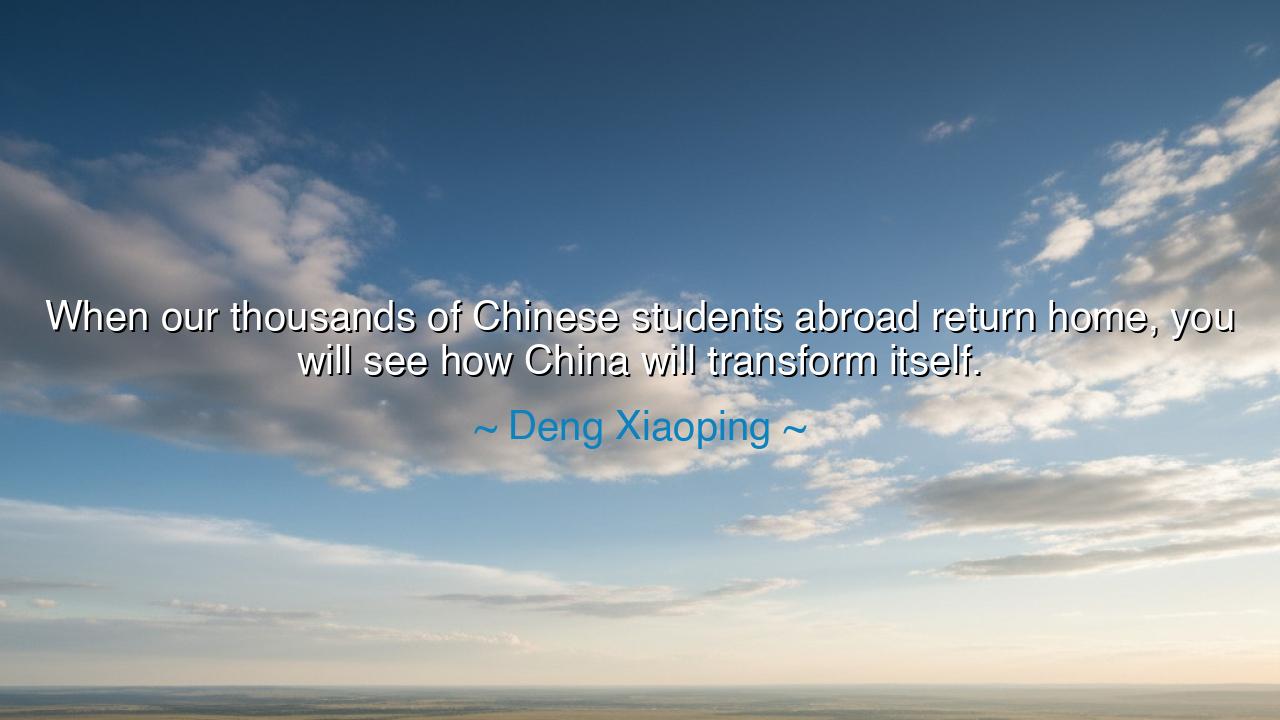
When our thousands of Chinese students abroad return home, you
When our thousands of Chinese students abroad return home, you will see how China will transform itself.






“When our thousands of Chinese students abroad return home, you will see how China will transform itself.” Thus spoke Deng Xiaoping, the architect of modern China, a man who rebuilt a nation not through conquest, but through vision and patience. His words ring not as a boast, but as a prophecy — a quiet confidence in the power of knowledge, youth, and renewal. Like the sages of old, Deng saw that the true strength of a civilization does not lie in armies or wealth, but in the minds and spirits of its people. He foresaw that the returning students — those who ventured into the wide world seeking wisdom — would one day carry back to their homeland the light that would awaken a new era.
The origin of this quote lies in the late 1970s and early 1980s, during China’s period of Reform and Opening Up. After decades of isolation and hardship, Deng understood that the path to national rejuvenation could not be built on ideology alone. China needed knowledge — new science, technology, management, and ideas drawn from the world beyond its borders. And so, he sent forth the youth of his nation, thousands upon thousands of students abroad, not as wanderers, but as seeds scattered to foreign soil, destined to return bearing fruit. To some, this was a gamble; to Deng, it was destiny. He trusted that education would be the bridge between the past and the future, between China’s ancient soul and its modern awakening.
In these words, Deng revealed his deepest wisdom: that transformation begins not with power imposed from above, but with enlightenment that rises from within. The returning students were not merely scholars; they were to become the architects of renewal, carriers of new methods, new disciplines, and new ways of seeing the world. They would not imitate the West, but learn from it — absorbing its knowledge while retaining the essence of Chinese civilization. Deng’s vision was neither imitation nor resistance, but synthesis — a harmony between tradition and progress, between East and West.
History proved him right. In the decades that followed, millions of students left China to study in universities around the world. Many returned — scientists, engineers, economists, and entrepreneurs — and with them came new industries, new technologies, and new dreams. They built universities, laboratories, and companies that carried China from poverty to power. It was the return of the knowledge diaspora that gave form to Deng’s prophecy: a nation that once looked inward turned its gaze outward, learned, and then looked back within — stronger, wiser, and ready to shape its own destiny.
One need only recall the story of Tu Youyou, a Chinese pharmacologist who combined Western scientific methods with traditional Chinese medicine to discover artemisinin, a cure for malaria. Her work saved millions of lives and earned her a Nobel Prize, but more importantly, it embodied Deng’s vision — the fusion of global learning with national heritage. She was not a student abroad, but her spirit mirrored the same ideal: that true progress comes from integration, not isolation. Those who returned from distant lands carried this same torch — a belief that knowledge, once shared, can lift not just individuals, but entire civilizations.
Deng’s words, though spoken in a specific time, echo with eternal meaning. Every nation, every generation, faces the same challenge — to send its sons and daughters into the unknown, trusting that they will one day return not corrupted, but enlightened. It takes faith to let go, and wisdom to receive them back. For the young who go forth to learn must remember: they carry their homeland within them. And when they return, they must not bring only ideas, but purpose, character, and service — the will to transform not only their country, but the hearts of their people.
The lesson, then, is both national and personal. Seek knowledge beyond your borders, but never forget the soil






AAdministratorAdministrator
Welcome, honored guests. Please leave a comment, we will respond soon